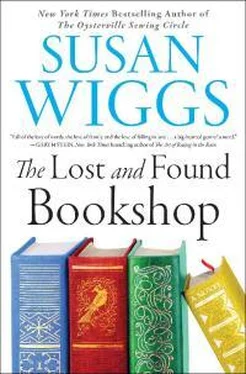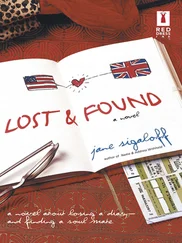A snap of anger went off in Natalie. Really, Mom? Really?
It wasn’t something to deal with right now, thought Natalie. Not this precise moment. But the truth stared her in the face. The shop and all its contents would need to be sold, sooner rather than later.
She put away her coffee cup and checked the time. She and Cleo and Bertie planned to open the shop today. For the time being, in honor of her mother’s life’s work, they would carry on. Business as fucking usual.
Natalie knew how to open, though she hadn’t done so since her college years. The morning routine was both familiar and mournful. Turning on the shop lights, she passed by shelves and table displays her mother had arranged. There were signs hand-lettered by Blythe, highlighting topics and titles of interest. In the café area, her mother had designated the week’s five-dollar special—a morning glory muffin and autumn-spiced latte. Natalie checked the supplies and made a note to get the muffins from the bakery across the way.
Last, she switched on the sign—a neon of an open book—and went behind the counter. The stool by the register had been her mother’s perch for the past thirtysomething years. Her mom was left-handed, so Natalie had to move the mug full of pens, the mouse and keyboard.
Taking her place on the stool, she was flooded with anxiety. Judging by the contents of her mom’s medicine cabinet, her mother had suffered from unspoken worries of her own. Had she fretted about the finances? Had she ever made a plan? Or had she believed that, like the denouement of a favorite novel, everything would work out in the end?
I don’t want to be mad at you , thought Natalie. Yet there was no mistaking the burn of frustration trying to make its way through her.
Mom used say, “To find out who you are, remember who you used to be.”
Deep breath. Close your eyes. Try not to cry. Natalie opened her heart to her mother, remembering when and how she’d come to the realization that she was a misfit.
* * *
Each day after school, Natalie took the city bus home, jumping off at the corner of Perdita and Encontra Streets and running half a block down to the bookstore. The grand entryway had a heavy glass door framed by lacquered black-painted woodwork, and a honeycomb pattern of black-and-white tile on the floor of the foyer.
She burst inside, jangling the bell over the door. Her mother was at the counter, perched on a tall swivel stool, a book open in front of her, a pretty scarf around her head.
“Mama, are we poor?” Natalie asked, shrugging out of her backpack.
“No,” said her mother offhandedly, scarcely glancing up. “Why do you ask?”
“Kayla Cramer says we’re poor. She called me a bad name—said I was a mongrel.”
Her mother’s lips twitched a bit. As she often did, she took To Kill a Mockingbird from her w.o.w. shelf. “‘It’s never an insult to be called what somebody thinks is a bad name. It just shows you how poor that person is, it doesn’t hurt you.’”
“She’s not poor,” Natalie insisted. “We are. Kayla says that’s why we never go on vacation even when school is out.”
“We go on a grand adventure every time we open a book.” Mom handed her a padded envelope from a pile of mail on the counter. “The new Judy Blume book just came in from the publisher, and you can have the first copy.”
Natalie eagerly snatched it up. “I can’t wait to read it,” she declared. “But reading a book is not the same as a vacation, and you know it.”
“If you’re talking about flying to Hawaii or Paris, then you’re right. But just because we can’t afford fancy trips doesn’t make us poor. Do you have homework?”
“I had math, but I did it during recess.”
“You’re supposed to play during recess.”
“I don’t like playing with kids who call me poor.”
Mom quirked her brow. “I don’t blame you. I wouldn’t want that, either. I’m glad your homework is done. We’ve got plans for tonight.”
“Really? What plans?”
Mom grinned at her. “We’re going to China. How’s that for travel?” She motioned Natalie to the office cubby in the stockroom and grabbed a granola bar from a box on the shelf. “May Lin’s taking us to Heavenly Days.”
Their favorite restaurant in all Chinatown. “Can I get the Warrior Bowl?”
“Sure.” Her mother tucked a stray lock of hair behind her ear. “Listen, we have our health, and a roof over our heads, food to eat, and books to read. We’re doing okay, kiddo.”
Natalie felt deflated by her mother’s logic. It was the kind of thing you couldn’t argue with or if you tried, you’d seem silly. “Where’s Grandy?” she asked.
“In the basement, puttering around,” Mom said. “Always looking for his father’s hidden treasure.”
It was a family joke that Grandy’s father, old Julius Harper, believed there was treasure in the Sunrose Building. According to Grandy, Julius’s mother had hidden something, and then she’d died in the 1906 earthquake and Julius went to an orphanage and the treasure was lost forever. Grandy had grown up hearing stories about it, but they were just that—stories. Not real like her friends’ vacation trips to places like Manhattan and Mexico.
The bell jingled, and Mom went quickly to the front. “Hi there. Can I help you?”
The customer was a guy with a ponytail and a concert T-shirt. In the olden days, Grandy would have called him a hippie. “Thanks. Taking a look around,” he said. “I just finished The Things They Carried , and my brain needs to take a breather.”
“I hear you,” Mom agreed. “It’s like wading through a maze. Maybe you’d like a more straightforward narrative? Here’s our fiction table.”
“Anything you’d recommend?” the guy asked.
“All of them,” she said. “Otherwise they wouldn’t be on my table. If you like cool, funny entertainment, you might like this one. It’s a first novel by a local author.” She handed him a copy of Practical Demonkeeping. “A very different kind of buddy novel. I thought it was hilarious.”
“You’re reading me like a book.” The guy shook his head as if embarrassed by his own lame joke. Then he looked over at Blythe. Natalie saw his gaze move swiftly over her mother’s red V-neck sweater and short skirt. “How can you tell that’s exactly what would make me happy?” he asked.
Oh boy. He was flirting. Guys did that a lot with her mom. She was super pretty, and Natalie knew it wasn’t only because Mom was her mom and all kids thought their moms were pretty. Even her snottiest friends like Kayla said Blythe looked like a model. Like Julia Roberts. Plus, her mom had a knack for dressing cool and being social—she could talk to anyone and make them like her.
Also, she had a superpower, which was on full display right now. She had the ability to see a person for the first time and almost instantly know what book to recommend. She was really smart and had also read every book ever written, or so it seemed to Natalie. She could talk to high school kids about Ivanhoe and Silas Marner . She ran a mystery discussion group. She could tell people the exact day the new Mary Higgins Clark novel would come out. She knew which kids would only ever read Goosebumps books, no matter what, and she knew which kids would try something else, like Edward Eager or Philip Pullman.
Sometimes people didn’t know anything about the book they were searching for except “It’s blue with gold page edges” and her mom would somehow figure it out.
What Mom wasn’t so good at was understanding that sometimes Natalie wished they lived in a real house like a regular family.
Читать дальше












